 Evolution
Evolution
 Life Sciences
Life Sciences
Professor Dave in His “Debate” with James Tour Showcases the Art of Citation Bluffing

YouTube personality Dave Farina (aka Professor Dave) “debated” James Tour last Friday about researchers’ progress in unraveling the mystery of life’s origin. The exchange proceeded as I anticipated. Farina immediately sought to hijack the debate, turning it from an honest discussion about science to something more akin to a World Wrestling exhibition match.
After spewing insults and other invectives, Farina primarily engaged in a less than honorable debating technique known as citation bluffing — supposedly proving a point by citing technical literature but misrepresenting its content. When Farina addressed the science, he rifled through a long series of technical articles, but he greatly exaggerated the relevance of the studies to what could have occurred on the early earth.
Amino Acids and Polypeptides
A central topic of the debate was the plausibility of amino acids linking (aka polymerization) in water into long chains (aka polypeptides) that could serve the role of proteins in modern cells. Tour explained the implausibility of such a scenario due to amino acid side chains interfering with the growth of the main polypeptide chain. Farina countered by listing several technical articles that he claimed proved the opposite, but the data in those very papers showed that several of the side-chain versions indeed cannot be accommodated.
Farina also neglected to disclose that all the studies he cited either used chemically altered amino acids, unnatural environments, or specialized molecules to facilitate the linking. Comparable conditions could never have occurred on the ancient Earth. The titles of the articles appeared to support Farina’s claims, but the actual details of the experiments demonstrated the opposite. Tour in his videos has explained why, as I summarized in previous articles (here, here, here).
Tour is hardly alone in recognizing the challenge of forming polypeptides in water. The journal Nature published an article, “The Water Paradox and the Origins of Life,” that stated the problem as follows:
…life’s cornerstone molecules break down in water. This is because proteins, and nucleic acids such as DNA and RNA, are vulnerable at their joints. Proteins are made of chains of amino acids, and nucleic acids are chains of nucleotides. If the chains are placed in water, it attacks the links and eventually breaks them. In carbon chemistry, “water is an enemy to be excluded as rigorously as possible”, wrote the late biochemist Robert Shapiro in his totemic 1986 book Origins, which critiqued the primordial ocean hypothesis.
Proposed solutions to this challenge require physical processes that dehydrate pools of water, allowing amino acids to join, but even then, the side-chain interference remains. Polypeptides with the proper bonds could never have existed in non-trace quantities. Another problem is that the required intensity of heat or other sources of energy destroy biologically relevant molecules such as RNA and sugars, so any progress toward life would be immediately lost. Tour explained these issues in his video that critiqued Lee Cronin’s research.
Self-Replicating RNA
A second topic addressed was research into self-replicating RNA, an essential component of the RNA world hypothesis. Tour pointed out that anytime chemical methods are used, the RNA nucleotides, RNA’s building blocks, hook up in the wrong way, and chains also include unnatural branching. Further, he stated that investigators have only been able to create RNA molecules that could copy a small percentage of themselves. Farina again responded by quickly displaying several research papers whose titles suggested that Tour was mistaken, and again Farina’s portrayal of the studies was false.
The experiments only succeeded in linking RNA strands together or copying a small portion of themselves. In all cases of polymerization, the wrong linkages and branching ensued. The true replication was performed by complex molecules borrowed from modern cells under carefully orchestrated experimental conditions. Therefore, none of the studies had any relevance to what could have occurred in nature, as Tour detailed in previous videos.
During the discussion about RNA, Farina made his most outlandish accusation. He claimed that Tour did not properly interpret a graph of 13C NMR spectra of the products from one of Steven Benner’s experiments related to the formation of ribose, a sugar used in nucleotides. Farina’s assertion was the equivalent of claiming that the head of a radiology department could not properly interpret an x-ray.
The motivation for this desperate attempt to discredit Tour was obvious. Tour exposed how the reaction Benner used to generate ribose also generated many other molecules. The ribose could never have separated from the other molecules to drive the production of nucleotides in non-trace quantities. Consequently, RNA molecules sufficiently long to self-replicate could never have existed.
The research would have no relevance to life’s origin even in the ideal scenario where only the four nucleotides formed in high concentrations. The smallest RNA that could possibly self-replicate is around 200 nucleotides. The challenge is that the number of possible nucleotide sequences that long is over 10120, and the percentage of sequences that could perform self-replication must be miniscule. Benner acknowledged in his article “Paradoxes in the Origin of Life” that sufficient RNA could never have formed for even one to have the correct information to self-replicate. The RNA world hypothesis is a nonstarter.
Lesson from the Debate
The debate offered an important lesson about the state of origin-of-life research. Tour’s critique of the field is so devastating that the only way to challenge his arguments is to misrepresent the technical literature and to engage in tactics founded on misdirection and disinformation. The post-debate comments on YouTube revealed that some who initially supported Farina recognized that his arguments and monologues were full of sound and fury but contained little substance.
